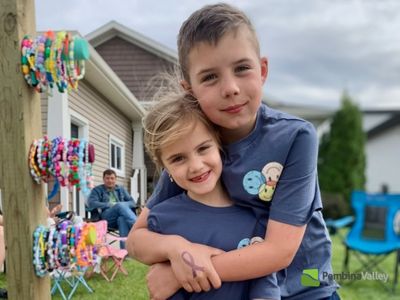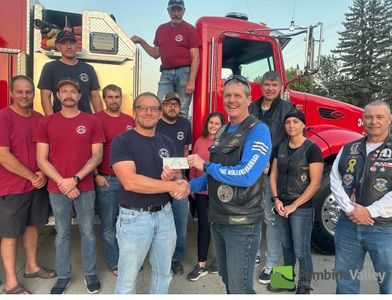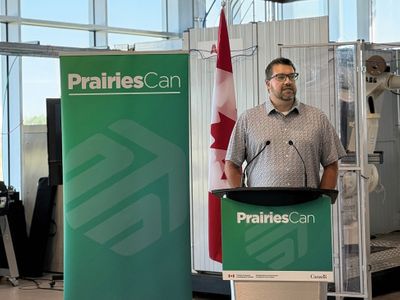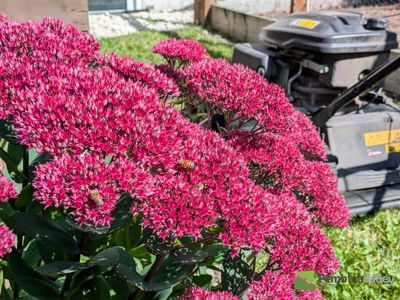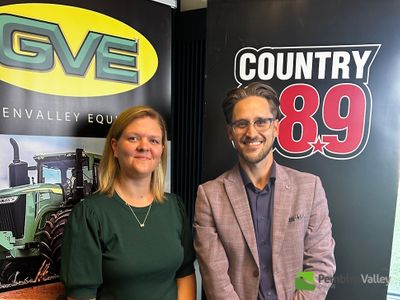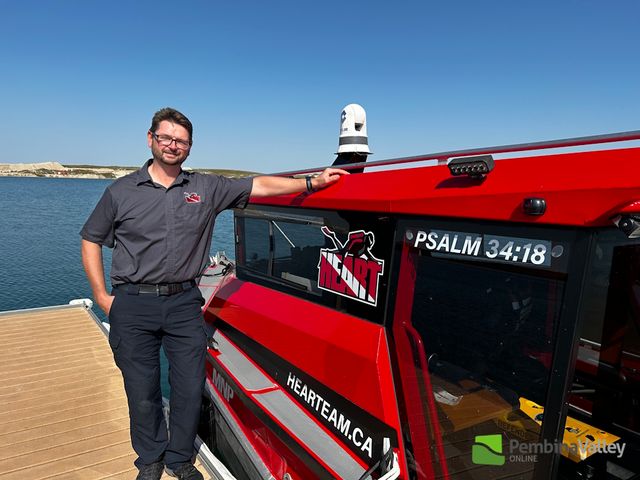Local News
Hutterite HEART: How faith is bringing victims home to grieving families
At Oak Bluff Colony Farms, surrounded by prairie sky and the quiet rhythm of communal life, you’ll find Manuel Maendel. He is a teacher, diver, and founder of HEART, the Hutterian Emergency Aquatic Response Team. For Manuel, HEART wasn’t born from a business plan or a random idea. It began as a spark planted in his heart as a child. “I believe the inspiration came from God,” Manuel says. “Just me as a little boy wanting to be a scuba diver, from a story that I heard my teacher tell in school, how she got certified in the Bahamas. She could breathe underwater, float weightless… just listening to that, I wanted to do that.” That curiosity became a quiet obsession. “You’d find me in the library reading all the Jacques Cousteau books,” he laughs. “I’d page and page till I found the divers. Those were the stories I read. I didn’t know there was a reason behind it or why God was maybe lighting this little flame in my heart to be a diver. But looking back, I can see it.” A tragic drowning changes everything That flame grew brighter after tragedy struck. “We had a drowning here at our colony,” Manuel recalls quietly. “We searched for three days before somebody called in the police dive team to check the gravel pit. I was 16 at the time, and I sat on shore watching them.” For most people, witnessing a recovery operation would be difficult enough. For Manuel, it became a turning point. “I was fascinated by the work they did, the way they suited up, how calm and professional they were. I wanted to ask them so many questions. And when they recovered that little boy, it did something to me. It just… it stuck.” That moment changed the course of his life. Learning to dive and convincing the colony Determined to learn, Manuel and his brother convinced the colony to let them get certified. “We had to convince the colony there was a purpose behind us getting certified,” Manuel explains. “So we told them we could check our irrigation system underwater and fix stuff, which was true, and they agreed.” He smiles remembering that time. “I was able to convince my brother to come along with me. He had never thought of it before, but he’s always up for adventures. And our dive instructor at the time became a fast friend. He’s still part of the team today.” From hobby to search and recovery At first, diving was just a skill they used for maintenance work. But soon, tragedy called them into deeper waters. “When there was a drowning at another colony near Portage, people said, ‘You guys are divers, is there nothing you can do to help?’” Manuel remembers. “We had never done anything like that before. But we showed up with our equipment, tied off with ropes, and did a search along the shore. We were effective, as unskilled as we were, because we were comfortable in those environments.” It happened again a few years later, and that is when the idea for HEART was born. “On the way home, we were like, man, if we’re going to be doing more of this, we need to be better prepared. We need to be better trained. So we decided to pursue public safety diving, pursue higher skills, and train seriously.” Within minutes, the name was created: Hutterian Emergency Aquatic Response Team, or HEART. “It came out of thin air,” Manuel says. “In five minutes we had the name, and my nephew designed the logo we still use today.” HEART as a ministry For Manuel, HEART is not just a rescue team. It is a calling. “As Christians, I believe we are the light of the world,” he says. “If God has given us the resources and the capabilities to help, we should help. We will drop everything to go and help. That is culturally very common on a Hutterite colony.” The team never charges families for their services. “We do this free of charge. We rely on donations, and the Lord has supplied all our needs so we can do this for free. It’s actually like salvation. You just have to say yes, I need help, and we’ll do it.” That commitment has opened the door for conversations about faith, often in the middle of some of the most difficult moments of a family’s life. Stories of hope from families Some of the most moving moments for Manuel come long after a search is over. “As time goes by and healing happens, families are actually able to see God in the whole scenario,” he says. “There was one family in Alberta who told us they were waiting for us for days. They tracked our van on a map and said just seeing us pull into the parking lot brought them peace. The father said it didn’t even matter whether we found his son or not. We brought peace.” Manuel pauses before adding, “This was a Muslim family. And I told them, I hope you recognize this is not us bringing you peace. We hope you can recognize Jesus in this. And they said they did.” Training the next generation As HEART’s reputation has grown, Manuel has begun training others, both on his colony and beyond. “All across Canada, HEART can’t be everywhere,” Manuel explains. “If a family calls me from BC, I want to be able to put them in contact with an agency close by so they can be helped sooner.” He is also training his sons and nephews. “One of my sons is 18 and comes on searches. My younger son is 13 and loves the technology, but I don’t want to expose him to trauma too soon. We see a lot of dark things we have to process internally. But when these young men see the impact that it has, that they’ve done something incredibly important that glorified God, the Lord can use that to grow their faith.” Related stories: New Sonar Helps Hutterite Dive Team Make Quick Recoveries Ted Falk honours Queen's Platinum Jubilee award recipients Moving forward in faith Looking to the future, Manuel isn’t focused on building a legacy. He is focused on following God’s lead. “I’m actually in the moment, walking step by step in faith, being guided by a passion that the Lord gives me,” he says. “I can set other teams up with equipment and training, but I can’t give them God’s blessing. They have to pursue that themselves. But if they do, He will equip them beyond their wildest imaginations. I’m living proof of that.” Supporting HEART HEART operates entirely on donations. When they deploy, it can cost thousands of dollars each day to keep the team working until a search is complete. Community support helps cover fuel, training, and equipment so that families in crisis never see a bill. Those who want to help can learn more by visiting or follow HEART on Facebook to see updates and support ongoing searches. With every trip and every recovery, HEART continues to live out its name, bringing hope and closure where it is needed most.
